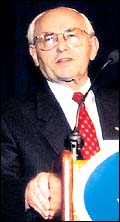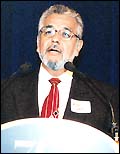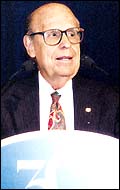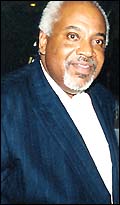
GERMAN INTOLERANCE CONDEMNED
|
Helsinki Commission Panel
|
|
Stresses that Religious
|
|
Freedom Must Be Protected
By Peter Mansell |

| |
 |
The hearing by the Commission on Security and Cooperation in Europe followed formal reports by the U.S. State Department, the United Nations Human Rights Committee and other international human rights bodies criticizing Germany for discrimination against religious minorities. |
 |

n a special session on September 18, 1997 on Capitol Hill, congressional members of the U.S. Commission on Security and Cooperation in Europe (CSCE), also known as the Helsinki Commission, vowed to take action against European governments that fail to honor international human rights agreements.
Germany featured prominently in the proceedings as the Commission heard testimony from representatives of minority religions that have suffered politically generated discrimination. Among those giving evidence was a panel of artists and entertainers, including John Travolta, Isaac Hayes and Chick Corea.
A longtime member of the Church of Scientology, Travolta said he appeared before the Commission “to lend a voice to the many people in Germany whose rights as human beings and citizens are being trampled. Because they are members of minority religions, they are denied the rights of everyday people. Their experiences of discrimination and persecution go unheard because there is nobody to speak up for them.”
Commenting on failed efforts by the Young Union — a branch of Chancellor Helmut Kohl’s ruling Christian Democratic Union — to induce German filmgoers to stay away from the film Phenomenon because of his own religious beliefs, Travolta said, “Of course, we can chuckle about it because in the overall scheme of things these boycotts did no great harm. However, the mere attempt by politicians to censor art because of the artist’s religious affiliation sends chills down my spine.”
Academy Award-winning composer Isaac Hayes and jazz great Chick Corea, also Scientologists, told the Commission members of discrimination they witnessed firsthand in Germany.
“An unfettered iron fist looms over religious minorities in Germany,” said Hayes, “and they never know when or where it will strike next. This Commission can make a dramatic difference by demanding that Germany immediately stop the harassment of religious minorities and meet its international human rights obligations.”
Describing pervasive discrimination by German governments at federal, state and local levels as “chilling,” Corea said, “What bothers me is the fact that this can happen on the threshold of the year 2000, in a country we think is a democracy.”
Travolta, Hayes and Corea urged the Commission to send a fact-finding delegation to Germany to verify that nation’s violations of the rights guaranteed under the Helsinki Accords, also known as the Helsinki Final Act, signed by more than 50 nations in Europe plus the United States and Canada, to monitor and uphold agreements regarding human rights.

|

| ||
 |
Senator Alfonse D’Amato of New York: “We will hold to account those governments that fail to live up to their promises.” |  |
Congressman Matt Salmon of Arizona: “I believe we ought to do everything within our power to correct these injustices.” |
 |
Senator Alfonse D’Amato (R-N.Y.), co-chairman of the Helsinki Commission, along with Congressman Christopher H. Smith (R-N.J.), denounced discrimination against Scientologists in Germany. “We will hold to account those governments that fail to live up to their promises,” Senator D’Amato said.
Other officials of the Commission said they would raise the issue directly with their German counterparts, and many commented forcefully against minority religious discrimination in Germany at the hearing.
After hearing that prejudice existed against Jehovah’s Witnesses, Charismatic Christians, Muslims, Scientologists, Mormons and other religions, Congressman Matt Salmon (R-Ariz.), mentioning his own membership in the Church of Jesus Christ of Latter-day Saints, stated, “If America stands for anything, it stands for religious freedom.”
Noting that religious intolerance has placed religious freedom at risk, Congressman Steny Hoyer (D-Md.), founding member of the Commission, said, “The promise of the Helsinki Final Act was that it was the vigilance of our neighbors as well as that of ourselves that would protect those basic freedoms.”
“Religious freedom is not just something for religious people nor is it isolated from the other freedoms,” co-chairman Smith said. “Religious freedom is essentially the right to freedom of speech, thought and assembly directed toward one’s deepest spiritual needs. If the state is permitted to deny these basic rights to one person or group on the basis of religion, what is to prevent the state from denying these other persons or other groups for other reasons?”
A Clear Pattern
Others presenting testimony included Shimon Samuels, director of international liaison of the Simon Wiesenthal Center in Paris, and representatives of various faiths, including Mormons, Muslims, Jehovah’s Witnesses and Charismatic Christians.
W. Cole Durham Jr., professor of law at J. Reuben Clark Law School, Brigham Young University, told the Commission that certain European governments possess “an incredible tendency to over-react” toward religions and to seek an excuse to control them.
“Some of the most heinous acts in Germany include arson attacks on residences, some of which have resulted in the deaths of children and the elderly,” said Laila Al-Marayati, president of the Muslim Women’s League. “Similarly, arson and vandalism have been reported against mosques, cultural centers and businesses owned by immigrants or ethnic minorities.”
“A clear pattern,” she said, “has emerged of ill treatment of foreigners and ethnic minorities.”
James A. McCabe, associate general counsel of the Watchtower Bible and Tract Society of Pennsylvania, noted that even though Jehovah’s Witnesses have practiced their religion in Germany since 1897, 100 years later — in June 1997 — Germany’s Federal Administrative Court “denied Jehovah’s Witnesses the guarantee of the rights of a corporation under public law.” In other words, in the eyes of the German state, they don’t exist as a recognized religion.

|

| ||
 |
John Travolta: “[T]he mere attempt by politicians to censor art because of the artist’s religious affiliation sends chills down my spine.” |  |
Isaac Hayes: “An unfettered iron fist looms over religious minorities in Germany, and they never know when or where it will strike next.” |
Stephen Selthoffer, a German freelance journalist who is also director for legal and media affairs of the Evangelical and Charismatic Church of Cologne, testified about the severe discrimination experienced by members of independent Christian denominations in Germany.
Selthoffer condemned the so-called “sect commissioners” of the two government-recognized and government-financed German churches — the Catholic and Lutheran Churches. These individuals, he said, “coveting significance and political power” and “citing ‘potential’ problems, historical fears and worldwide worst-case scenarios,” endeavor to frighten politicians into enacting oppressive government controls to protect the established churches’ monopoly on state finances and support.
The sect commissioners’ concerns stem at least in part from a massive exodus of members that has plagued Germany’s two major religions in recent years. During 1995, the most recent year for which figures are available, 168,000 Catholics and 296,000 Lutherans in Germany quit their churches.
With approximately 900 small Christian churches in Germany today serving 300,000 citizens of all denominations, a significant number of German Christians have obviously chosen to worship outside the state churches. These citizens and their churches, according to Selthoffer, face “false accusations from ‘sect commissioners’ and federal officials coupled with money from the city coffers.” As a result, independent Christian churches are forced into the position of using collections from their Sunday offerings in expensive legal defenses to counter spurious charges mounted by government “experts.”

| |
 |
Chick Corea: “What bothers me is the fact that this can happen on the threshold of the year 2000, in a country we think is a democracy.” |
 |
Shortly thereafter, House Concurrent Resolution 22 was heard by the International Relations Committee of the House and passed by a 13–2 vote.
The resolution has yet to be considered by the full House of Representatives. Rather, in late 1997, a procedural vote was taken to decide whether the urgency of the situation in Germany warranted suspension of the normal rules of review.
More than 100 representatives voted affirmatively, expressing adequate personal knowledge of the discrimination to pass the resolution immediately. Others said the issue was serious enough to deserve further review and voted to uphold the normal procedures. No votes were cast against the issue, as no such vote was called for, contrary to German press reports quoting German Foreign Minister Klaus Kinkel.
Speaking at the CSCE hearings, Congressman Salmon put the importance of the issue in its proper perspective when he said that what is happening in Germany “breaks my heart as a member of Congress and as a member of this Commission. I believe we ought to do everything within our power to correct these injustices.”

|
|
 |
German political parties utilize Nazi-like propaganda “art,” as with this booklet, portraying religions as insects to be crushed. |
German leaders’ most visible response to the hearing — while denying discrimination existed — was to threaten to blindly unleash its intelligence agency to monitor members of minority religious organizations on foreign soil. For this agency, known by its German-language acronym “BND,” “monitor” is a euphemism for such actions as opening mail, electronic surveillance, physical surveillance and infiltration of targeted religious organizations. Such espionage activities in other countries by BND would be illegal.
The late September announcement prompted sharp criticism both outside Germany and within, including from the opposition Green Party. One German newspaper declared, “Sparrows are being shot with rockets,” wryly suggesting that Germany, in order not to cancel jobs in volume because of the end of the Cold War, needed new enemies.
Such intelligence agency action, if green-lighted, would empower German spies to investigate the private lives of individuals or organizations in the United States and other nations suspected of membership in or connection to minority religious groups. A few weeks later, however, in response to pressure, the German government announced it would not implement the plan to utilize its intelligence agency.
But at the same time, to demonstrate just how dark the picture has become, German intolerance reached across the ocean and an employee of the New York City branch of the Deutsche Bank was fired from her job — allegedly because of her religious affiliation. The woman, Josie Romero, a Scientologist and United States citizen, experienced no problems at the bank during her roughly eight-month employment there until top executives learned of her religious affiliation. She is now suing the bank under United States anti-discrimination laws and under state and city human rights laws.
The hearings of the Commission on Security and Cooperation in Europe followed formal reports by many international human rights agencies, including the United Nations Human Rights Committee and the U.S. State Department, which have criticized Germany for discrimination against Scientologists and other religious minorities.

|
|
| Claudia Engel of Frankfurt, Germany, testifies about government discrimination against religions in Germany while John Travolta looks on. |
Criticism of politically endorsed intolerance in Germany continued at the annual conference in Warsaw of the Organization for Security and Cooperation in Europe.
David Little, a member of the United States delegation, briefed the international gathering on the evidence of discrimination and intolerance against minorities in Germany.
The head of the Church of Scientology’s European Human Rights Office, Martin Weightman, also addressed the entire delegation. After providing clear examples of religious intolerance in Germany, Weightman noted that “Dialogue is a basic principle of democracy and an integral principle of the OSCE [Organization for Security and Cooperation in Europe] process. Yet, to date, all levels of the German government have refused to enter dialogue.”
The response from the German representative was so noticeably short on facts that Weightman was invited to attend a special conference to brief the public and international media on the problem.
Conduct Speaks Louder than Words
The Helsinki Accords mandate that participating nations “will respect human rights and fundamental freedoms, including the freedom of thought, conscience, religion or belief, for all without distinction as to race, sex, language or religion.” They also hold that “participating States will recognize and respect the freedom of the individual to profess and practice, alone or in community with others, religion or belief acting in accordance with the dictates of his own conscience.”
The Organization for Security and Cooperation in Europe, established to bring about international compliance to the Accords, today has more than 50 members. In the United States, CSCE was established by Congress to ensure other nations are in compliance with the Accords.
Obviously, the degree to which each member nation enforces such rights is an index of the quality of its democracy. Although Germany and other European nations under the spotlight signed the Helsinki Accords, the many witnesses at the Washington hearing and the Warsaw conference who described governmental disregard for those promises and for other human rights treaties guaranteeing the fundamental right to religious freedom belie those countries’ commitment to such laudable ideals. Referring to such violations, Senator D’Amato put it succinctly: “Their conduct speaks louder than their words.”

